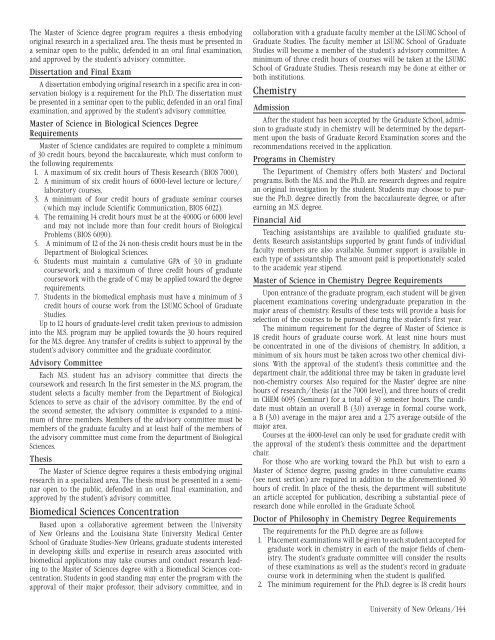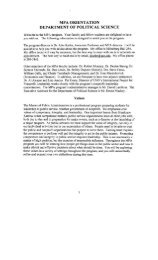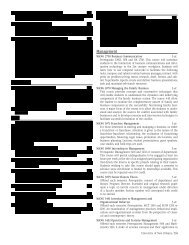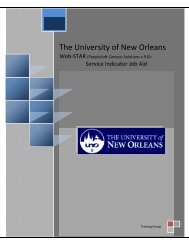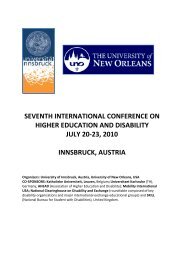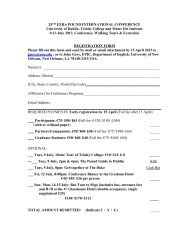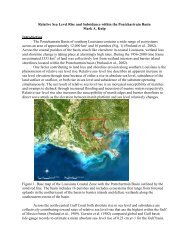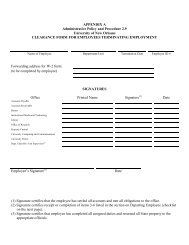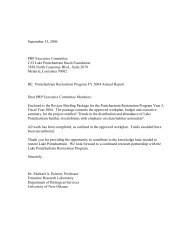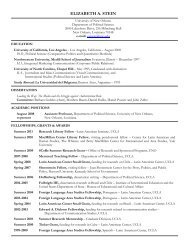Untitled - University of New Orleans
Untitled - University of New Orleans
Untitled - University of New Orleans
You also want an ePaper? Increase the reach of your titles
YUMPU automatically turns print PDFs into web optimized ePapers that Google loves.
The Master <strong>of</strong> Science degree program requires a thesis embodying<br />
original research in a specialized area. The thesis must be presented in<br />
a seminar open to the public, defended in an oral final examination,<br />
and approved by the student’s advisory committee.<br />
Dissertation and Final Exam<br />
A dissertation embodying original research in a specific area in conservation<br />
biology is a requirement for the Ph.D. The dissertation must<br />
be presented in a seminar open to the public, defended in an oral final<br />
examination, and approved by the student’s advisory committee.<br />
Master <strong>of</strong> Science in Biological Sciences Degree<br />
Requirements<br />
Master <strong>of</strong> Science candidates are required to complete a minimum<br />
<strong>of</strong> 30 credit hours, beyond the baccalaureate, which must conform to<br />
the following requirements:<br />
1. A maximum <strong>of</strong> six credit hours <strong>of</strong> Thesis Research (BIOS 7000),<br />
2. A minimum <strong>of</strong> six credit hours <strong>of</strong> 6000-level lecture or lecture/<br />
laboratory courses,<br />
3. A minimum <strong>of</strong> four credit hours <strong>of</strong> graduate seminar courses<br />
(which may include Scientific Communication, BIOS 6022).<br />
4. The remaining 14 credit hours must be at the 4000G or 6000 level<br />
and may not include more than four credit hours <strong>of</strong> Biological<br />
Problems (BIOS 6090).<br />
5. A minimum <strong>of</strong> 12 <strong>of</strong> the 24 non-thesis credit hours must be in the<br />
Department <strong>of</strong> Biological Sciences.<br />
6. Students must maintain a cumulative GPA <strong>of</strong> 3.0 in graduate<br />
coursework, and a maximum <strong>of</strong> three credit hours <strong>of</strong> graduate<br />
coursework with the grade <strong>of</strong> C may be applied toward the degree<br />
requirements.<br />
7. Students in the biomedical emphasis must have a minimum <strong>of</strong> 3<br />
credit hours <strong>of</strong> course work from the LSUMC School <strong>of</strong> Graduate<br />
Studies.<br />
Up to 12 hours <strong>of</strong> graduate-level credit taken previous to admission<br />
into the M.S. program may be applied towards the 30 hours required<br />
for the M.S. degree. Any transfer <strong>of</strong> credits is subject to approval by the<br />
student’s advisory committee and the graduate coordinator.<br />
Advisory Committee<br />
Each M.S. student has an advisory committee that directs the<br />
coursework and research. In the first semester in the M.S. program, the<br />
student selects a faculty member from the Department <strong>of</strong> Biological<br />
Sciences to serve as chair <strong>of</strong> the advisory committee. By the end <strong>of</strong><br />
the second semester, the advisory committee is expanded to a minimum<br />
<strong>of</strong> three members. Members <strong>of</strong> the advisory committee must be<br />
members <strong>of</strong> the graduate faculty and at least half <strong>of</strong> the members <strong>of</strong><br />
the advisory committee must come from the department <strong>of</strong> Biological<br />
Sciences.<br />
Thesis<br />
The Master <strong>of</strong> Science degree requires a thesis embodying original<br />
research in a specialized area. The thesis must be presented in a seminar<br />
open to the public, defended in an oral final examination, and<br />
approved by the student’s advisory committee.<br />
Biomedical Sciences Concentration<br />
Based upon a collaborative agreement between the <strong>University</strong><br />
<strong>of</strong> <strong>New</strong> <strong>Orleans</strong> and the Louisiana State <strong>University</strong> Medical Center<br />
School <strong>of</strong> Graduate Studies–<strong>New</strong> <strong>Orleans</strong>, graduate students interested<br />
in developing skills and expertise in research areas associated with<br />
biomedical applications may take courses and conduct research leading<br />
to the Master <strong>of</strong> Sciences degree with a Biomedical Sciences concentration.<br />
Students in good standing may enter the program with the<br />
approval <strong>of</strong> their major pr<strong>of</strong>essor, their advisory committee, and in<br />
collaboration with a graduate faculty member at the LSUMC School <strong>of</strong><br />
Graduate Studies. The faculty member at LSUMC School <strong>of</strong> Graduate<br />
Studies will become a member <strong>of</strong> the student’s advisory committee. A<br />
minimum <strong>of</strong> three credit hours <strong>of</strong> courses will be taken at the LSUMC<br />
School <strong>of</strong> Graduate Studies. Thesis research may be done at either or<br />
both institutions.<br />
Chemistry<br />
Admission<br />
After the student has been accepted by the Graduate School, admission<br />
to graduate study in chemistry will be determined by the department<br />
upon the basis <strong>of</strong> Graduate Record Examination scores and the<br />
recommendations received in the application.<br />
Programs in Chemistry<br />
The Department <strong>of</strong> Chemistry <strong>of</strong>fers both Masters’ and Doctoral<br />
programs. Both the M.S. and the Ph.D. are research degrees and require<br />
an original investigation by the student. Students may choose to pursue<br />
the Ph.D. degree directly from the baccalaureate degree, or after<br />
earning an M.S. degree.<br />
Financial Aid<br />
Teaching assistantships are available to qualified graduate students.<br />
Research assistantships supported by grant funds <strong>of</strong> individual<br />
faculty members are also available. Summer support is available in<br />
each type <strong>of</strong> assistantship. The amount paid is proportionately scaled<br />
to the academic year stipend.<br />
Master <strong>of</strong> Science in Chemistry Degree Requirements<br />
Upon entrance <strong>of</strong> the graduate program, each student will be given<br />
placement examinations covering undergraduate preparation in the<br />
major areas <strong>of</strong> chemistry. Results <strong>of</strong> these tests will provide a basis for<br />
selection <strong>of</strong> the courses to be pursued during the student’s first year.<br />
The minimum requirement for the degree <strong>of</strong> Master <strong>of</strong> Science is<br />
18 credit hours <strong>of</strong> graduate course work. At least nine hours must<br />
be concentrated in one <strong>of</strong> the divisions <strong>of</strong> chemistry. In addition, a<br />
minimum <strong>of</strong> six hours must be taken across two other chemical divisions.<br />
With the approval <strong>of</strong> the student’s thesis committee and the<br />
department chair, the additional three may be taken in graduate level<br />
non-chemistry courses. Also required for the Master’ degree are nine<br />
hours <strong>of</strong> research/thesis (at the 7000 level), and three hours <strong>of</strong> credit<br />
in CHEM 6095 (Seminar) for a total <strong>of</strong> 30 semester hours. The candidate<br />
must obtain an overall B (3.0) average in formal course work,<br />
a B (3.0) average in the major area and a 2.75 average outside <strong>of</strong> the<br />
major area.<br />
Courses at the 4000-level can only be used for graduate credit with<br />
the approval <strong>of</strong> the student’s thesis committee and the department<br />
chair.<br />
For those who are working toward the Ph.D. but wish to earn a<br />
Master <strong>of</strong> Science degree, passing grades in three cumulative exams<br />
(see next section) are required in addition to the aforementioned 30<br />
hours <strong>of</strong> credit. In place <strong>of</strong> the thesis, the department will substitute<br />
an article accepted for publication, describing a substantial piece <strong>of</strong><br />
research done while enrolled in the Graduate School.<br />
Doctor <strong>of</strong> Philosophy in Chemistry Degree Requirements<br />
The requirements for the Ph.D. degree are as follows:<br />
1. Placement examinations will be given to each student accepted for<br />
graduate work in chemistry in each <strong>of</strong> the major fields <strong>of</strong> chemistry.<br />
The student’s graduate committee will consider the results<br />
<strong>of</strong> these examinations as well as the student’s record in graduate<br />
course work in determining when the student is qualified.<br />
2. The minimum requirement for the Ph.D. degree is 18 credit hours<br />
<strong>University</strong> <strong>of</strong> <strong>New</strong> <strong>Orleans</strong>/144


